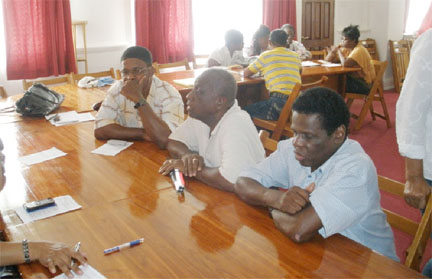The Guyana Council of Organisations for Persons with Disabilities has started implementing a voter education project with a Needs Assessment Workshop aimed at empowering the differently-abled to exercise their franchise.
In a press release, the Council said the project, titled ‘Voting Rights: Ensuring Access for Persons with Disabilities,’ is funded by the United States Agency for International Develop-ment (USAID) through Tetra Tech ARD, which implemented the Governance Enhancement Project in Guyana. Representatives from 17 disability organisations attended the workshop, which discussed a number of issues, including accessibility to polling stations, discomfort with polling procedures and general lack of knowledge of electoral rights.

“This project represents a major step in the move towards greater political inclusion for the disability community,” the Council said. It started on June 1 and it is expected to run until one month after the general and regional elections. The main components of the project are: Civic Education; Voter Education for Persons with Disabilities; Legal Provisions for Persons with Disabilities in Guyana’s Elections; and Guidelines for Trainers.
The project also aims to foster training, develop training skills and enhance knowledge among leaders in the disability community; provide information for persons with disabilities to assist them in making informed choices; increase knowledge about the election process and voting rights among individual citizens; provide support for persons with disabilities who wish to participate in the election process and to offer recommendations to the Guyana Elections Commis-sion (GECOM) about ways to increase polling place accessibility for persons with disabilities.
The release said the workshop will be facilitated mostly by persons with disabilities as well as officials from GECOM.
In addition, members of the disability community will participate in creating flyers and public service announcements about the activities. Disability advocate organisations will also collaborate with local government officials in their respective regions to raise awareness about the challenges facing voters with disabilities, the Council said.
Persons living with disabilities are frequently excluded from various activities through ignorance and lack of resources, the Council said. It also said that it hoped that after this exercise it will see an increase in voter turnout. By law there are three provisions that allow a disabled person to exercise their right to vote: a person with a disability who is unable to cast his or her vote independently can delegate a friend or family member to fill out his or her ballot, after both individuals have taken an oath. Any such designated individual can represent only one person with disabilities and must be a voter at the same polling station, the Council said.
Secondly, the law provides that a person with a disability may apply to have their ballot cast by proxy. In this case, the person is not required to be present at the polling station; their delegate appears for them. And, lastly, a presiding officer at the polling centre can mark the ballot as requested by a person with a disability. Persons with disabilities have started investigating polling station accessibility and voter readiness among persons with disabilities across the regions.
The workshop was held at the Cheddi Jagan Research Centre.




